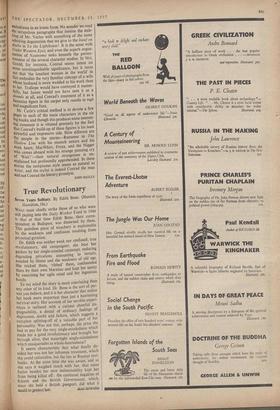True Revolutionary Seven Years Solitary. By Edith Bone. (Hamish Hamilton,
18s.) WHAT must chiefly strike those of us who were still paying into the Daily Worker Fund in 1949 is that at that time Edith Bone, their corre- spondent in Budapest, was disowned by them. This pointless piece of treachery is explainable by the weakness and confusion resulting from Perpetual gyration.
Dr. Edith was neither weak nor confused; true revolutionary, old campaigner, she beat her gaolers by her single-minded contempt, enduring degrading privations amounting to torture, assailed by illness and the weakness of old age. She tricked them, 'ribbed' them, confounded them by their own Marxism and kept her sanity by exercising her agile mind and her ingenious hands. To my mind the story is more convincing than any other of its kind. Dr. Bone is the sort of per- son you believe, and it is her character that makes her book more important than just a heartening survival story. Her account of her terrible experi- ences is surfaced with a curious cheerful im- pregnability, a denial of ordinary feelings of depression, doubt and failure, which suggests a complete splitting-off of a valuable part of her personality. Was not this, perhaps, the price she had to pay for the very single-mindedness which made her a good revolutionary and brought her through alive, that watertight single-mindedness which masquerades as whole-heartedness? It seems characteristic that what finally de- cided her was not her inhuman treatment, which she could rationalise, but the lies in Russian text- books. At the same time she was aware, and as she says it weighed much with her, that some factor besides her own indomitability kept her from being killed off : the continual inquiries of friends and the British Government, which, since she held a British passport, did what it
could to protect her. =AN HOWARD






































 Previous page
Previous page